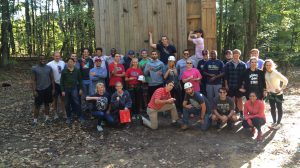
Students in Senior Leadership Class always enjoy a variety of activities, including trips away from campus. (Submitted photo)
Companies often use a transcript as validation of “aptitude” but then use an interview to evaluate “attitude.” How does an engineering school teach attitude to the millennial generation? Students born between the early ’80s and 2000 may have very different views on cultural identity, politics, workplace expectations and technology. For the University of Mississippi School of Engineering, the attitude advantage continues to be delivered through the ENGR 400 “Leadership and Professionalism” course.
Forty-five students come to class each Friday in the fall, anxious to hear words of wisdom from a variety of guest speakers. Every semester offers a different lineup of speakers, panel discussions, events and activities.
“The class this year has been very enriching,” said David Phelts, a senior geological engineering major from Atlanta, Georgia. “Being able to listen and learn from many successful alumni and leaders in the community is something I would never have been able to get from a textbook. I’m confident I will be able to apply the valuable lessons learned from great guest speakers we’ve had this fall as I make my transition to the professional world.”
From military leadership philosophy to corporate engineering, entrepreneurial startups and success stories to U.S. congressional leadership, municipal leadership, international humanitarian leadership, from young alumni to seasoned professionals, and everything in between, students gain a new attitude about leadership and professionalism through this course. Co-taught by Dean Alex Cheng and Assistant Dean Marni Kendricks, students are challenged to define their professional goals and leadership aspirations by the end of the semester.
Reading John Maxwell’s “The 21 Indispensable Qualities of a Leader,” students have the opportunity to assess these qualities in their lives and improve themselves. Networking with the Engineering Advisory Board, participating in the Fall Career Fair and a team-building afternoon at the Rebel Challenge Course, attending business etiquette luncheons, giving 60-second impromptu elevator pitches, and practicing mock interviews and business correspondence are all part of their professional development, one of the major goals of the course.
Technical skills, soft skills and leadership skills are distinct terms used in the workplace. It is assumed that all engineers have the first skill set accomplished by the time they graduate.
“Having the benefit of an engineering school in the middle of a liberal arts university where social life is such a significant part of the campus, we believe soft skills naturally develop to some extent,” Kendricks said. “Leadership skills can always be enhanced, but for 21- to 22-year-olds, hearing heart-to-heart words of wisdom and encouragement on a weekly basis from a wide variety of leaders is like signing up for a class but receiving a bar of 24 carat gold … far better than just an A.”
If interested in speaking to this class, please contact Marni Kendricks, mckendri@olemiss.edu.